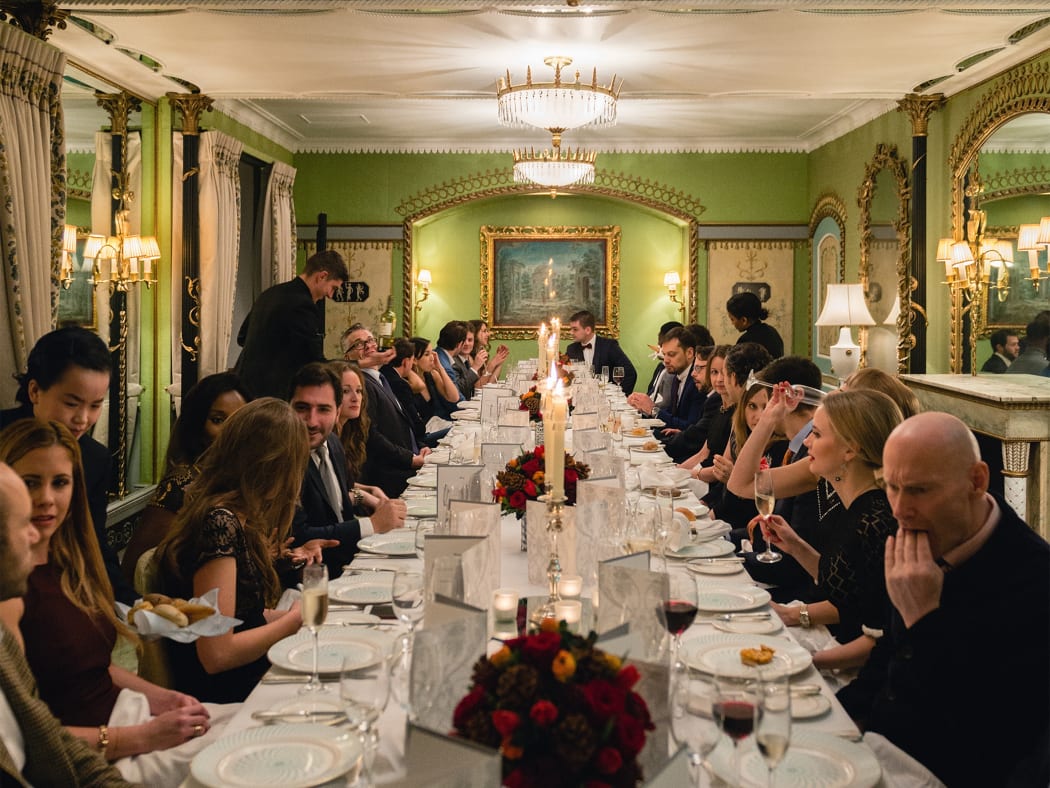
"I want to rule and have possessions!"
Goethe - Faust
In his speech from 1966 on the suggestive theme Culture and Corporation’s Support of the Arts, David Rockefeller declares that he believes in the specific benefits that art provides companies with: "From an economic standpoint, such involvement can mean direct and tangible benefits. It can provide a company with extensive publicity and advertising, a brighter public reputation and an improved corporate image." Among the many masterpieces that the eminent banker collects to subsequently donate to renowned institutions, thus fulfilling his role as a prominent patron of MoMA, there is a portrait of Félix Fénéon.
In the portrait painted in 1890 by his friend Paul Signac, we see Fénéon offering a white flower against a background of explosive colours; a gesture of elegant generosity that made him well-known and a symbol of the mutual support that boosted his steps and that he practised relentlessly throughout his life. There is something magic in the figure of this civil servant of the Ministry of War, critic, theorist, editor, collector and anarchist activist. Imprisoned in 1894, he was miraculously acquitted during the Procès des Trente, where he brilliantly and ironically defended himself. Upon being released from prison he went on to run La Revue Blanche and, successively, the Bernheim-Jeune Gallery. Besides the excellence of Signac's paintings, he presumably considered the candid offer of Fénéon as a gesture to identify himself with, perhaps due to his remarkable philanthropic endeavour. Whether he knew or not that state forces suspected that Fénéon had left but not offered a pot of flowers with an explosive device at the restaurant of the Hotel Foyot just a few minutes before a detonation is something we can only guess.
Be that as it may, the American tycoon is a fervent collector that considers this passion as a useful tool in business: "It can build better customer relationships, a readier acceptance of company products and a superior appraisal of their quality. Promotion of the arts can improve the morals of employees and help to attract qualified personnel." Robert Kingsley, another American senior executive, puts it in a more concise but equally suggestive way: "Exxon’s support of the arts serves the arts as a social lubricant." We must say that, coming from the renowned oil company, this image appears to be extremely effective.
However, sometimes the practice of the arts aims precisely to question the hand that so generously feeds it. There might be some projects that cause discomfort, such as On Social Grease, by Hans Haacke, where we may find, among others, the above-mentioned declarations of Rockefeller and Kingsley. Or, ORDER. Act III. Dinner at The Dorchester, the last part of the triptych of the Colectivo DEMOCRACIA. Its video suggests an opera, in which the woman playing the main role, a waitress that we discover is an extremely talented performer, tells painful truths; her bel canto is addressed first to the guests of the economic elite (they are not actors, but dinner guests that play the role of what they actually are), and then us, the audience, witness and accomplice of the social injustice that surrounds us in our everyday life.
It might be that among the exclusive guests at the Dorchester dinner, there could be some patrons of the arts, determined to follow Rockefeller and Exxon's steps. In her well-known research L’1%, c'est moi, Andrea Fraser focuses precisely on this ambiguous relationship that the artist analyses not only from the standpoint of corporate benefits, but also emphasising the underlying inequality of the income (with considerable attention to the outcomes of financial economy). According to William N. Goetzmann, Luc Renneboog and Christophe Spaenjers in an article published in the journal Yale School of Management Working Paper in 2010: "a one percentage point increase in the share of total income earned by the top 0.1% triggers an increase in art prices of about 14 percent. […] Indeed, it is the money of the rich that pushes up the prices of art. This means that we may expect that art prices will thus rise faster when the population or income inequality increases."
Because, with regard to art and money, it always has something to do with magic. Or at least with imagination, and, in some specific circumstances, with shared hallucination, as Marcel Duchamp had already sensed in his Cheque Tzanck from 1919. The French artist carried out by hand a very neat facsimile of an ordinary cheque to pay the bill of his dentist and passionate collector, Daniel Tzanck. Sometime later, Duchamp bought back his cheque, but this time for a higher amount than the 115$ amount guaranteed by The Teeth's Loan & Trust Company Consolidated of New York.
In Money and Magic (A Critique of the Modern Economy in Light of Goethe's Faust), Hans Christoph Binswanger, much like the way the French artist spoke out on the concept of the value of paper in his 'ready-made imitated and rectified', observes: "This act of creation by the economy exerts a huge fascination, the fascination of the infinitely augmentable, that is, of eternal progress. The economy thus gains the transcendental character (i.e., surpassing all limits) which man formerly sought in religion. It is not belief in a hereafter, but economic activity in the here and now that opens up modern man's perspective on eternity." In his study on Faust, he displays a panoply of arguments that are related to ecology, classical economy or alchemy in order to question the theory of infinite growth (that really operates today as a blind and extremist faith) advocated by capitalism, despite the fact that its desires are based on energy resources that are increasingly scarce.
According to Binswanger, Goethe found in paper currency "alchemy continuation by other means." Undoubtedly, both art and economy have difficulties with regard to the sense of limit; both try their best, and with much magic, in their opus magnum to achieve something that is obviously ephemeral.
(English translation: Beatrice Krayenbühl)

